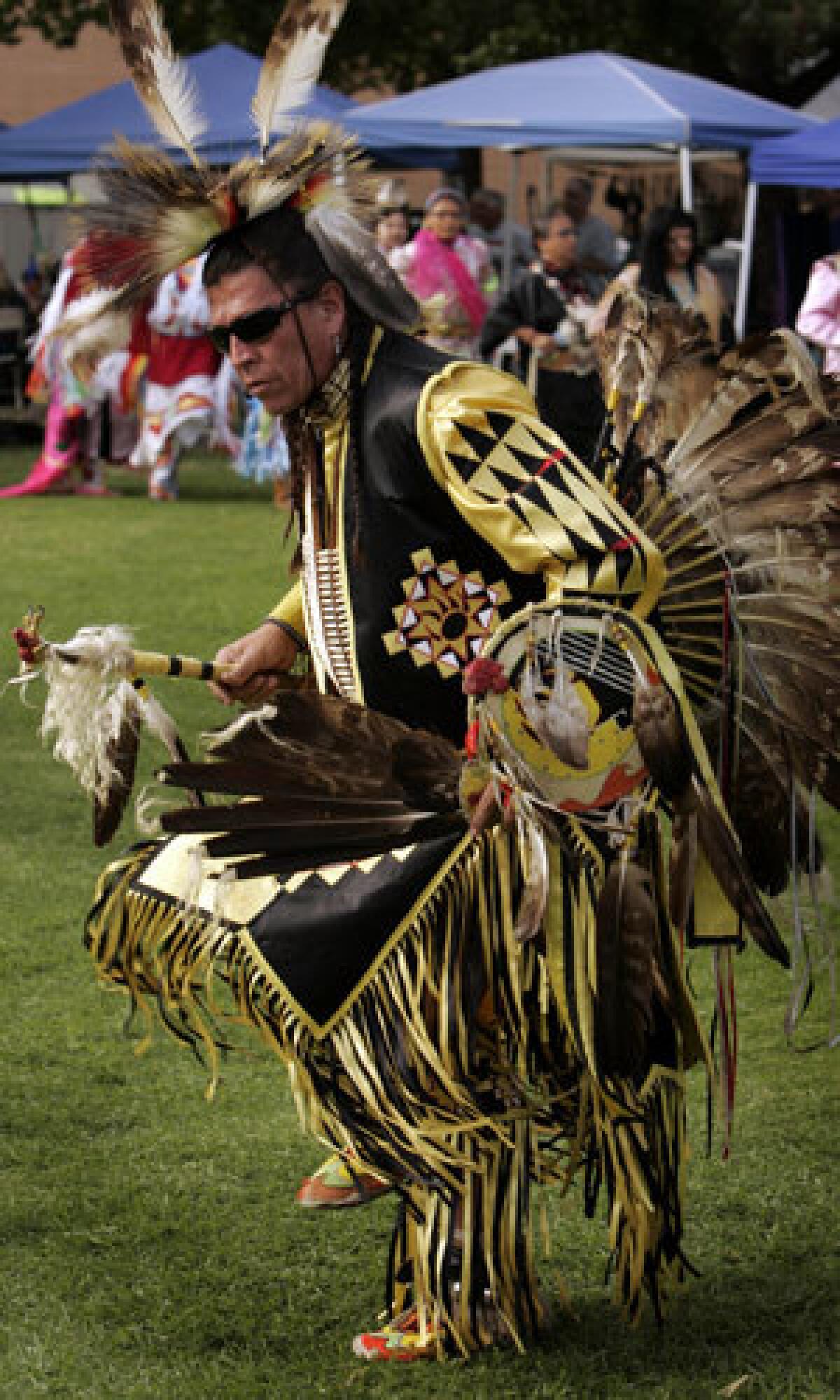Northern Southern Winds Pow-Wow blows into Chinatown

- Share via
You’ll feel the drums before you see them. Approaching a Native American powwow affects the viscera first, throbbing the gut in a way that no rock concert can. Hives of tribal dancing and music, powwows center around an open arena rimmed with drummers who thunder away on animal skins and chant songs passed down through generations. Dancers fill the center ring, strutting and crouching to the rhythms; their beaded breastplates, fringed shawls and plumed headdresses twitch in time.
These gatherings originated on the North American plains as dance competitions, but these days the festivities also play to the rapt curiosity of the non-indigenous.
The Northern Southern Winds Pow-Wow, which takes place in L.A. this weekend, was first conceived in 1994 by college students.
“Originally, we started this as an alternative celebration to Cinco de Mayo, to all the drinking and the partying,” recalls Meno Martinez, one of the event’s founders. “We wanted to make something more culturally relevant.”
What resulted was a Los Angeles tradition that drew vendors and dancers from as far away as Canada and New Mexico for a weekend of dancing, art and traditional cuisine.
That is, until the East Los Angeles College campus where it was held underwent construction and the grassy field used for the powwow was paved over. Understandably, the Native American rituals just weren’t the same on a slab of asphalt. A parallel to history, some might argue.
Of the powwow’s location troubles, Martinez says with a sigh, “Historically, there’s been such tremendous injustice to Native American cultures and we’re still fighting for our traditional lands.” However, he quickly moves past the topic, more inclined to talk about the future than the past.
After taking a hiatus last year, the powwow has now relocated to Los Angeles State Historic Park, a wedge of verdant land on the outskirts of Chinatown, transformed by the 2005 “Not a Cornfield” agricultural art project.
Martinez describes the park, once the site of an ancient Tongva village, as a “beautiful location with good energy.”
Anthony Morales, also known as Chief Redblood of the Gabrieleno/Tongva of San Gabriel, approves of the new locale, noting that State Historic Park is indeed ancestral land.
He adds, as an afterthought, “Everything around downtown Los Angeles was, at one point.”
Over three days, visitors can learn about Native American music, watch craft demonstrations, duck into a tepee and listen to storytelling from elder tribe members.
There will also be handmade jewelry and art vendors on-site, as well as food booths offering traditional maize-based items such as tamales and roasted corn and, of course, Indian fry bread, a pillowy mound of fried dough topped with artery busters such as cheese and beef.
On Friday, Chief Redblood will bless the sacred space of the dance circle before the traditional gourd dance, which culminates in a crescendo of shaking rattles fashioned from hollowed gourds and decorated tin cans.
Saturday presents fancy dancers and an Aztec program, while Sunday includes a special Mothers’ Day celebration, inviting generations of moms into the dance arena to be presented tokens and gifts.
Chief Redblood asserts that unity is at the core of any powwow. Martinez echoes this, noting that his favorite aspect of the gathering is observing “different tribal nations dancing in unison in one circle, and opening it up to all. People are sacred, regardless if they’re indigenous to the Americas.”
Northern Southern Winds Pow-Wow Where: Los Angeles State Historic Park, 1245 N. Spring St., L.A.When: 6 to 10 p.m Friday; 10 a.m. to 10 p.m. Saturday and SundayPrice: Free entry, but vendors charge for food Contact: www.nosowinds.org
More to Read
The biggest entertainment stories
Get our big stories about Hollywood, film, television, music, arts, culture and more right in your inbox as soon as they publish.
You may occasionally receive promotional content from the Los Angeles Times.










